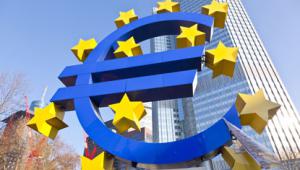By Judith Ugwumadu | 22 January 2015
The European Central Bank has launched a quantitative easing programme that will inject €1.1 trillion into the eurozone’s economy in a bid to boost growth and tackle deflation.
ECB president Mario Draghi said that the central bank would buy €60bn worth of public and private sector securities each month until at least September 2016.
Draghi said the programme would be ‘conducted until there was a sustained adjustment in the path of inflation’ close to 2%. December’s inflation figure for the currency bloc showed that prices had declined by 0.6%.
The Eurosystem of central banks, which is made up by the ECB and the central banks of all eurozone members, will begin to buy investment-grade bonds issued by euro area governments and agencies, as well as EU institutions, from March.
These purchases in the secondary market are intended to increase liquidity in the currency zone.
Purchases would be based on each national central bank’s share in the ECB’s capital structure.
Draghi said eligibility criteria would be applied to purchases of bonds from countries that were bailed out in the eurozone crisis and are under EU or International Monetary Fund supervision. These include Greece, Spain and Italy.
Draghi said the decision to launch a quantitative easing programme, which has already been used in the UK, the US and Japan, was intended to tackle low inflation and the ineffectiveness of monetary policy.
‘While the monetary policy measures adopted between June and September last year resulted in a material improvement in terms of financial market prices, this was not the case for the quantitative results.’
The ECB’s governing council would continue to closely monitor the risks to the outlook for price developments over the medium term, including the impact of exchange rate changes and the falling global oil price.
Laith Khalaf, a senior analyst at investment firm Hargreaves Lansdown, warned that the jury is still out on whether QE was an effective way to jump-start economies.
‘The difficulty in reaching a verdict is we do not know how much worse things would have been in the US and the UK without QE, though after delaying such action for so long, the current problems in Europe probably gives us as good an indicator as we are going to get,’ he added.












